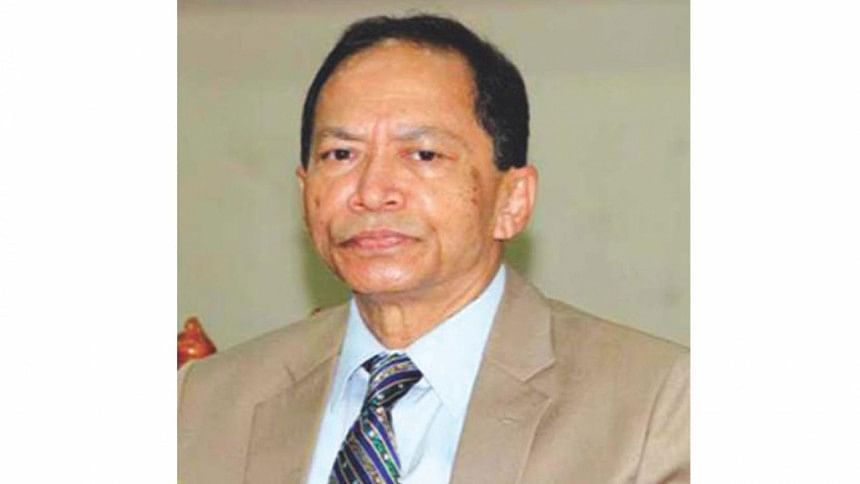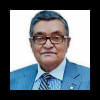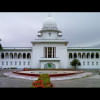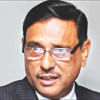Chief justice steps down

Amid flak from the ruling quarters over different issues including the 16th amendment verdict, Chief Justice Surendra Kumar Sinha resigned yesterday.
Now abroad, he sent his resignation letter to the Bangabhaban, the official residence of President Abdul Hamid, in the morning, President's Press Secretary Md Joynal Abedin told The Daily Star.
What reason Justice Sinha cited in the letter was yet to be known as the press secretary could not give details or say how it was sent.
The resignation letter will be placed before the president tomorrow (today) as Saturday is weekly holiday, said Joynal Abedin yesterday afternoon.
Talking to this correspondent, Law Minister Anisul Huq said he was yet to talk to the president over the issue and he did not know who will be the new chief justice.
“The appointment of the chief justice is an absolute prerogative of the president under the constitution. It is not my responsibility,” he said yesterday afternoon.
The minister said Justice Md Abdul Wahhab Miah, the senior most judge of the Appellate Division of the Supreme Court after Sinha, will continue to carry out the responsibility of the chief justice, under Article 97 of the constitution until a new chief justice is appointed.
TIME LINE |
|
August 18, 2014: Cabinet approved a proposal on amending the constitution to restore parliament's authority to impeach Supreme Court judges on grounds of misconduct or incapacity by abolishing the Supreme Judicial Council. Sept 17, 2014: Parliament unanimously passed the 16th constitutional amendment bill, empowering itself to remove SC judges for misbehaviour and incapacity. May 5, 2016: High Court declared the amendment illegal, unconstitutional and against the principles of the separation of state powers and the independence of the judiciary. May 5, 2016: Three ministers and several treasury and opposition bench MPs lambasted a High Court verdict that scrapped the 16th amendment to the constitution. July 3, 2017: The Supreme Court upheld the HC verdict, rejecting the government appeal against the HC verdict. July 9, 2017: Senior ministers and MPs from the treasury and opposition benches launched a blistering attack on the High Court and the Supreme Court for judgments against the Jatiya Sangsad's power to remove judges for incapacity or misconduct. On August 1, 2017: The full text of the SC verdict was released with some critical observation on governance, political culture and parliament. On August 7, 2017: Some senior ministers at cabinet meeting expressed strong disagreement with the SC over the restoration of Supreme Judicial Council for removal of SC judges on grounds of gross misconduct or incapacity. August 9, 2017: Food Minister Qamrul Islam if the chief justice doesn't step down by this month, lawyers would launch a vigorous movement next month to remove him. August 18, 2017: Liberation Wars Affairs Minister AKM Mozammel Huq Chief Justice SK Sinha has breached his oath of office by making unnecessary and irrelevant observations on the verdict and, therefore, lost the right to continue as chief justice. On August 22, 2017: Barrister Sheikh Fazle Noor Taposh, member secretary of Bangabandhu Awami Ainjibi Parishad, demanded resignation of Chief Justice SK Sinha and scrapping of the SC verdict and threatened of a movement otherwise. On September 13, 2017: Parliament unanimously passed a resolution for taking “proper” legal steps towards cancellation of the 16th amendment verdict and expunction of the chief justice's “unconstitutional, objectionable and irrelevant” observations in the verdict. On October 2, 2017: Law Minister said the CJ will go on a month's leave from October 3 on health grounds. On October 13, 2017: Justice Sinha said he was not sick as he left the country for Australia. On October 14, 2017: SC in a statement said Justice Sinha was facing 11 charges including “graft and money laundering”. November 11, 2017: CJ Sinha resigned from his office. |
Article 97 sates, “If the office of the chief justice becomes vacant, or if the president is satisfied that the chief justice is, on account of absence, illness, or any other cause, unable to perform the functions of his office, those functions shall, until some other person has entered upon that office, or until the chief justice has resumed his duties, as the case may be, be performed by the next most senior Judge of the Appellate Division.”
Contacted yesterday, Attorney General Mahbubey Alam said there is no provision of dismissing the resignation letter.
Justice Sinha left Singapore for Canada on Friday to see his ailing daughter when his 39-day leave on “health grounds” expired, said a close aide to him. He flew to Singapore from Australia for treatment on November 6.
He went on leave from October 3.
On October 12, a gazette notification issued by the law ministry said Justice Wahhab will carry out the duties of the chief justice till November 10 or until Sinha rejoins office.
Justice Sinha left for Australia the following night, months before the date of his retirement on January 31.
Just before leaving the capital, he said he was not sick, contradicting the government's claim that he went on leave on health grounds earlier this month.
"I'm not sick. I'm not fleeing. I'll come back. I'm a little embarrassed. I'm the guardian of the judiciary. I'm leaving for a brief period in the interest of the judiciary, and so that the judiciary is not polluted," he told reporters.
"I've no antipathy to anybody. It's my firm belief that the government has been misled. This is my statement [the written statement]. I won't say anything more."
In a written statement, he said, "I'm fully well, but the way a political quarter, lawyers, and especially some honourable ministers of the government and the honourable prime minister are criticising me recently over a verdict made me embarrassed."
Some people within the government have wrongly interpreted the verdict in the 16th amendment case and then presented it to the prime minister, making her upset, he said.
Sinha said he was a “bit worried about the independence of the judiciary”.
"Because citing the senior most judge [of the Supreme Court] who is now acting as the chief justice, the law minister yesterday [on October 12] said that the judge acting as the chief justice will bring changes to the Supreme Court administration soon.”
He further said, "There is no precedence of interference in the administration of the chief justice by the judge acting as the chief justice or the government. He [the judge acting as the CJ] will only discharge daily work as per the routine. It has always been like this.
"If any interference is made in the chief justice's administration, it can be easily assumed that the government is interfering in the higher court and this will lead to further deterioration of relationship between the judiciary and the government. It would not bring any good to the state."
The BNP and the Supreme Court Bar Association, which is dominated by pro-BNP lawyers, have been alleging that the government forced Justice SK Sinha to go on leave, but the law minister and the attorney general dismissed it.
On October 14, a day after Sinha left for Australia, the SC said Sinha is facing 11 charges, including money laundering and corruption.
The same day, the attorney general said Sinha's rejoining the office of the CJ after his return from abroad is “a far cry.”
Talking to The Daily yesterday, he said the government will now look into the 11 allegations.
Justice Sinha, appointed 21st chief justice of the country in January 2015, came under fire ever since the SC on August 1 this year released the full text of the verdict, scrapping the 16th amendment to the constitution.
The amendment had empowered parliament to remove judges for misconduct or incapacity.
Following the verdict, the prime minister and senior ministers came down heavily on the CJ, with many of them calling for his resignation.
Some pro-AL organisations, including Bangabandhu Awami Ainjibi Parishad, held protest programmes against him. Parishad leaders threatened to launch a tougher agitation if he didn't step down.
On September 13, the Jatiya Sangsad passed a resolution calling for legal steps to nullify the SC verdict. The law minister on several occasions said the government would seek review of the judgment.
In its full verdict, the SC made some observations, which were critical of the country's present political culture.
Talking to the media on August 13, the law minister was particularly critical of the CJ's observation that “no nation, no country is made of or by one person”.
This was irrelevant in the case at hand and also contrary to history, he said. “There is no doubt that history has been distorted here.”
The minister also said neither the country's independence nor its declaration happened overnight. Father of the Nation Bangabandhu Sheikh Mujibur Rahman declared it after earning the people's mandate through a political movement.
“It will be a crime if I distort it.”
While presiding over the Appellate Division bench, Justice Sinha had expressed annoyance and dissatisfaction several times at the government's failure to issue a gazette notification on the rules determining the discipline of lower court judges.
On April 4 this year, he said they (judges) were hurt when the government referred to the president, who is respected and acceptable, regarding the issuance of the gazette notification.
On March 28, he expressed discontent with the government for seeking more time for issuing the gazette notification.
On December 12 last year, Sinha said the president was misinformed about the issuance of the gazette.
He came up with the observation a day after the law ministry had issued a notification saying that the president decided not to issue a separate gazette notification on the conduct rules.

 For all latest news, follow The Daily Star's Google News channel.
For all latest news, follow The Daily Star's Google News channel. 








Comments